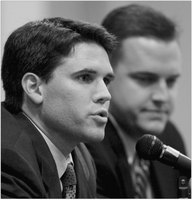Dripping Springs lawmaker seeks greater oversight of social services
March 6, 2007
State Rep. Patrick Rose, D-Dripping Springs, said he thinks it's fitting that he's taken the helm of the House panel that will examine the problematic privatization of social services enrollment in Texas.
Written by Corrie MacLaggan, Austin American-Statesman

Chairman Patrick Rose
State Rep. Patrick Rose, D-Dripping Springs, said he thinks it's fitting that he's taken the helm of the House panel that will examine the problematic privatization of social services enrollment in Texas. After all, it was Central Texas that served as the pilot area for the new centers that handle calls to enroll in public assistance programs such as Medicaid. And many of Rose's constituents in Hays County were among the thousands of Texans whose services were delayed when a private group led by Accenture LLP took over in January 2006. "What we do know for sure is that this experiment has gone terribly poorly," said Rose, who replaced former state Rep. Suzanna Hupp, R-Lampasas, as leader of the House Human Services Committee. As the new chairman — a reward for his loyalty to House Speaker Tom Craddick, R-Midland — Rose said he'll seek greater legislative oversight of the state's social services agencies and its contractors. He is concerned about the state's recent privatization of social services, he said, including the deal for the enrollment call centers and the planned outsourcing of the foster care system. The state expected to save $646 million over five years by turning over enrollment for social services programs that serve more than 3 million Texans to the Texas Access Alliance, a group of companies led by Accenture. So far, it has realized none of those savings. Rose said that a recent restructuring of what was originally an $899 million, five-year contract with the alliance for the call centers is the right move but that it might not be enough. The new deal, worth $543 million, returns to state workers some of the power to make decisions about who gets into the programs. Rose did not vote for the 2003 legislation that paved the way for the outsourcing. "I thought it was a bad idea at the time; I still do," he said. "I believe strongly in the ability of our state employees, and I do not think that privatization is some sort of silver bullet," Rose said. "We've seen with Accenture that it is not." The new enrollment plan — the nation's most ambitious privatization of social services — was intended to give Texans more ways to apply for public assistance (such as by phone and online) and to modernize the outdated computer backbone of the signup system. But when the pilot went into effect in Travis and Hays counties, Rose said, it was a disaster. "You couldn't get a straight answer; you were on hold; you sent in your paperwork, and it wasn't received in a timely manner or wasn't processed in a timely manner," Rose said. "You had people being told they needed to send in the paperwork they'd sent in weeks ago." Rose grilled the alliance on its performance during a panel meeting Feb. 23. In a discussion about the group's decision to proceed with the pilot rollout in January 2006, Rose told Randy Willis of Accenture and Dave McCurley of the alliance: "Respectfully, my constituents in Hays County would say that you shouldn't have." State officials halted the statewide rollout and stopped the pilot. Since June, the call centers have made significant improvements, Willis said. For example, the average time it took to answer calls was more than 10 minutes last March but has been below the two-minute guideline set by the state contract each month since June. "We can say proudly that we believe the program has stabilized and that it is performing," Willis said. "That doesn't mean we can sit back and rest." Rose said some questions about what went wrong are still unanswered. Last week, he formed a subcommittee, led by Rep. Abel Herrero, D-Robstown, to investigate the work done by Accenture. "Inheriting the system as we do right now, we've got to figure out the best way forward," Rose said. On Rose's radar: As the new chairman of the House Human Services Committee, state Rep. Patrick Rose, D-Dripping Springs, said that in addition to improving the call centers for enrolling Texans in public assistance, his top priorities this session are: •Children's Health Insurance Program. There were more than 500,000 children enrolled in CHIP in 2003. Today, there are about 325,500. 'We need to be more proactive in enrolling children in CHIP,' Rose said. His committee is considering proposals that would repeal enrollment restrictions passed by the Legislature during a budget crunch in 2003. •Child Protective Services. Saying that policy changes passed in 2005 have not been going as the Legislature intended, state Sen. Jane Nelson, R-Lewisville, chairwoman of the Senate Health and Human Services Committee, has proposed additional changes that she said will ensure that children have access to safe, loving homes. Rose is working on a bill that would be a House companion to Nelson's proposal, he said.
![]()
![]()
Related Stories
![]()
Fair Use Notice
This site contains copyrighted material the use of which has not always been specifically authorized by the copyright owner. We are making such material available in our efforts to advance understanding of environmental, political, human rights, economic, democracy, scientific, and social justice issues, etc. We believe this constitutes a "fair use" of any such copyrighted material as provided for in section 107 of the US Copyright Law. In accordance with Title 17 U.S.C. Section 107, the material on this site is distributed without profit to those who have expressed a prior interest in receiving the included information for research and educational purposes. For more information go to: http://www.law.cornell.edu/uscode/17/107.shtml. If you wish to use copyrighted material from this site for purposes of your own that go beyond "fair use", you must obtain permission from the copyright owner.